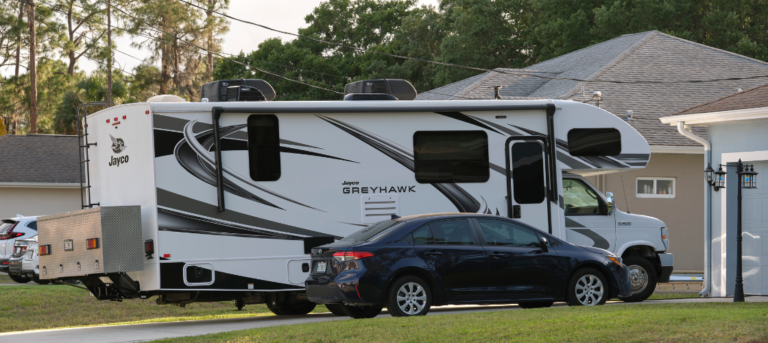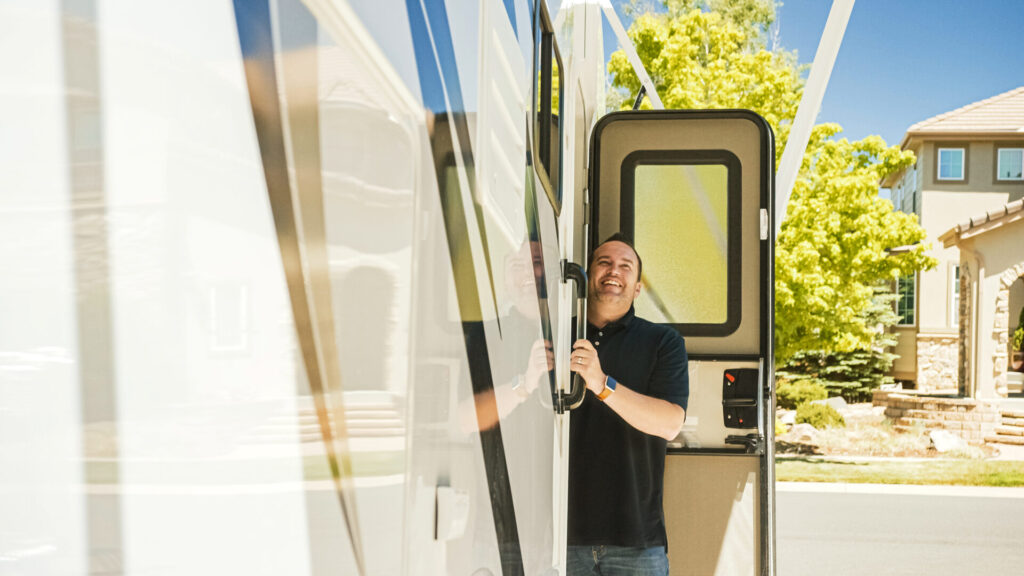
Moochdocking can be a wonderful way to celebrate the holidays with family or friends. Moochdockers can save money on expensive hotel stays, or even campground fees. It can also be convenient for hosts – you get to stay close to your loved ones without having them in your house the entire time.
What is Moochdocking?
Moochdocking is bringing your RV or trailer to a friend or family member’s house and staying in their driveway or on their property. Sometimes it includes using their power, and possibly their water, while you’re there. In other words, mooching off of them. It’s a convenient way to stay close to someone when you’re visiting … but not too close.
The Rules of Moochdocking
There’s no official rulebook of moochdocking, of course. But there are some guidelines you’ll want to be aware of. Some are just the principles of being a good almost-house guest. Some are rules that could get your RV kicked out of the neighborhood.
Make sure you’ll fit
Before showing up in someone’s driveway for Christmas, Cousin Eddie-style, you’ll want to make sure your rig will actually fit. Make sure your RV length allows you to park in the driveway, or that there’s an alternate spot you can park. Also, check that there aren’t any overhangs or trees that might be lower than the height of your RV. If you’re staying somewhere else on the property, make sure your RV can handle any roads and obstacles to get there.
Make sure HOA rules allow you to be there
Some HOAs may not allow moochdocking, or may only allow it in certain areas like behind a fence. Make sure you comply with HOA rules to avoid landing your hosts a fine … and to prevent yourself from getting the boot.
Be sure local laws allow you to be there
Along with HOA rules, there may be local ordinances regarding how long a vehicle can be parked on the street. If you’re parking in front of someone’s house, this may apply to you, and you’ll want to be aware of those laws.
Work out hookups or plan to boondock
Know ahead of time if you can hook up to your friend or family members’ electricity or water. If not, you’ll want to make arrangements and plan for boondocking.
Be a good guest
If you do plug into your host’s electricity, be mindful of how much power you’re using. If you run too many appliances at once, you could blow a fuse in their house. You could also use solar power or a generator. But once again, you’ll want to be a considerate guest when it comes to using a generator in a quiet neighborhood.
Plan the length of your stay ahead of time
Make sure you and your host work out how long you will stay beforehand. It’s true that one of the best parts of RVing is the flexibility it gives you, but you don’t want to overstay your welcome.
Benefits of Moochdocking as a Traveler

There are plenty of pros to moochdocking when you’re traveling to visit family or friends. Here are a few reasons you might find that it’s a convenient way to visit someone.
- Flexibility on arrival times: If you encounter travel hiccups – traffic, weather delays, or other obstacles – you can simply call the person you’re staying with and let them know. You won’t have any cancelation fees or have to pay for a night that you reserved but didn’t end up using.
- Flexibility on departure times: It’s important to not overstay your welcome, yes. But if you and your host are really enjoying your time together, you can always extend your trip without having to worry about extra fees.
- You’ll save money: You won’t need to pay for a campground or hotel stay while you visit (although it’s a nice gesture to bring a hostess gift, offer some money for utilities, or take care of dinner one night while you’re there).
- You’ll have some privacy: Staying in an RV allows you to be close to your loved ones, but to have room to retreat if everyone needs some quiet time. If you’re an early riser, you can get up, shower and dress, and enjoy some coffee without waking up the house. And if you’re a night owl, you can retreat to your RV to watch TV or work when everyone else goes to bed.
- It gives you extra facilities: No waiting for the shower, or having to make multiple pots of coffee in the morning when you have a whole other house in the driveway. During big holiday meals, it’s also another place to store, prep, and cook food for the feast.
Benefits of Moochdocking as a Home Owner
Moochdocking can also be helpful for the hosts! A lot of the benefits of moochdocking for homeowners are similar, like more privacy and extra facilities. But here are a few more:
- It’s less pressure: Often when you’re hosting, it can feel like you need to entertain your guests for the entire time. If they have an RV to retreat to at night, or where they can hang out in the morning, you have some time to yourself without feeling like you need to be constantly visiting with your guests.
- It’s fewer people bumping around the house: If you have a large group of people visiting for the holidays, or for a family vacation or other event, even roomy houses can feel cramped and crowded. An RV in the drive is more space and gives everyone room to spread out.
- It means comfortable places for everyone to sleep: You don’t need to make people camp out on the floor or double up rooms or sleep on a couch in the middle of the living room this way. Everyone gets a bed!
How to Make Moochdocking More Comfortable
To make moochdocking more comfortable, one of the first things to arrange is electricity and water. If it’s possible to hook the RV up to house power and water, that’s a great solution. If not, check for places to fill up, bring batteries, and find a local dump station nearby before you arrive.
Another way to make your stay more comfortable (and easy on your host!) is to bring everything with you. Have your own coffeemaker and kitchenware. Have towels and bed linens so you don’t need to use your host’s. You may even want to bring your own camp chairs to use on a patio or deck – the home where you’re staying may not have enough for a crowd!
If you have kids and are visiting a childless home, you’ll also want to bring all of the things they’ll need, like a portable high chair, stroller, or other baby gear. If the kids are older, you’ll want to bring things to entertain them. An RV allows you to even bring bikes, skateboards, and other large gear.
Other Times to Moochdock Besides the Holidays
Moochdocking is a great option for holidays, but it’s also convenient at other times. On a personal note, we set up an RV in our driveway when we had lots of family in town for a graduation. The graduate appreciated not having to give up her bed on her special day! Moochdocking is a great solution for any large family event where everyone’s congregating at one home.
It’s also a nice arrangement when you’re coming to visit a new baby. When it’s time for the baby (or mom!) to sleep, everyone can head to the RV to give the new family some privacy and rest. But you’re close at hand to help if the family needs that instead. Moochdocking is convenient if you’re visiting a family in a small house without much room. It’s also a nice perk to break up a long road trip. Take a rest from the road and get in some quality time with family all at once!
Choosing an RV Rental for your Moochdocking Adventure
You’ll want to think about the following as you browse RV rentals:
| RV Usage | Things to Consider |
| RV Type | – Size and floor plan (how many people will it sleep? how much storage do you need?) – Ground clearance if there’s uneven terrain (camping on undeveloped property) |
| Power & Energy | – Solar panels or generator availability – Inverter system (can you plug into the house?) – Battery capacity and condition – Backup power options (extra generator, portable batteries) |
| Water Management | – Freshwater tank size – Gray and black water tank size – Water pump quality – How will you refill fresh water and dump waste |
| Fuel | – Size of the fuel tank (for generator or vehicle itself) – Fuel efficiency – Extra fuel storage options |
| Heating & Cooling | – Is it well-insulated if camping in extreme weather? – Are there heating options? (propane, diesel heater, electric) – Are there cooling options? (roof fan, air conditioning, ventilation system) |
| Storage | – Storage space for food, clothes, and equipment – Accessibility of storage areas – Space for outdoor gear (camping chairs, bikes, etc.) |
| Cooking & Food Storage | – Will you be cooking in the RV? – Propane stove/oven or electric cooking options – Refrigerator/freezer capacity – Food storage (pantry space, ability to carry coolers) |
| Safety & Navigation | – Fire extinguisher and first aid kit – Navigation system (GPS, maps, offline apps) – Tire condition (spare tires, repair kits) – Security features (locks, alarms) |
| Connectivity | – Will you need a signal booster for cell service? – Do you need a satellite dish or Wi-Fi hotspot? |
If this is your first time renting an RV or motorhome, we have a guide to renting for you. Also, if the point of your trip is to visit family, and you don’t really want a road trip, you can also look into having the RV owner set the rig up for you for a fee. You’ll arrive with everything in place and ready to go.
Using or Renting a Driveway vs Choosing an RV Space Rental
If your own driveway won’t work as a camping spot due to size or slope concerns, you may be able to borrow or rent another driveway in your neighborhood.
Here are some of the things you may want to consider when choosing between renting or borrowing a drive way vs. booking at a campground:
- Having your family on your driveway or in a driveway rental in your neighborhood puts them very close to you. A campground gives you a little more space, and you’ll likely have some warning before they come over each day.
- Using your own driveway costs nothing, and renting a driveway from a neighbor who considers you a friend will likely cost very little. Most RV spaces for rent in campgrounds will cost more.
- Unless you (or your neighbor) have special hookups installed, driveway camping means your visitors likely won’t have full use of the amenities offered by an RV. For instance, their water usage will be limited by what the RV tanks can hold. Additionally, they will only be able to use whatever electric appliances can be run off the battery, unless you choose to run a generator. A full-hookup spot in a campground removes this challenge.
Both options have some good arguments for and against, so you’ll have to decide which choice is best for you.
Moochdocking can be a wonderful way to rest on a long road trip, or to see family while still giving everyone some space. Good planning and good communication will ensure that you and your host both have a great experience – perhaps the first of many!






